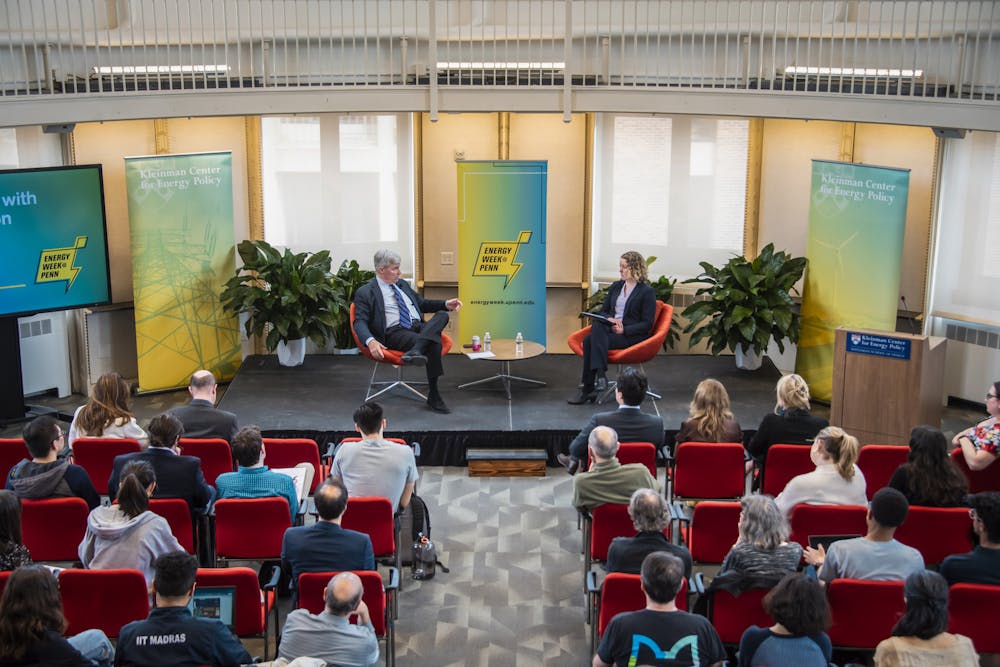The Kleinman Center for Energy Policy and Vagelos Institute for Energy Science and Technology hosted their fourth annual Energy Week from March 11 through 15, featuring panels, workshops, lightning talks, and lectures.
Energy Week at Penn aims to expose students and faculty to different aspects of energy research. This year’s Energy Week consisted of 26 events, both recurring and new — including a workshop for women interested in pursuing a career in energy and engineering and a fireside chat with University of Ghana School of Law Dean Raymond Atuguba.
These events were offered in person, virtually, and hybrid with sponsorship from 16 centers and schools. Executive Director of the Kleinman Center Cornelia Colijn, who helped execute Energy Week across campus, detailed the interdisciplinary nature of the programming.
“Even though [Energy Week] is technically housed by the Kleinman Center and the Vagelos Institute, we understand that the energy transition relies on contributions from across disciplines and across sectors,” Colijn said. “It’s about motivating and celebrating the work that is going on on campus and the interest that people have in their respective areas and disciplines.”
Oscar Serpell, the associate director of academic programming at the Kleinman Center, was also involved in organizing events, particularly those aimed at engaging students — such as an alumni career panel moderated by Scott Kleinman, who graduated from Penn in 1994 and founded the center in 2014.
“Part of what makes this week so much fun and interesting is having all these diverse partners and having all of these topics that relate in different ways to energy policy,” Serpell said.
While Energy Week did not adopt a specific theme, Colijn noted that energy justice served as a unifying element between the various events this year.
“We have to be incredibly careful in the way that we design projects to ensure that we are very intentional to not overburden communities and individuals that have long been left behind,” Colijn said. “That [idea] seemed to come up a lot in our events."
RELATED:
Fourth annual Penn Climate Week features wider student engagement in climate action
Penn professor, renowned climate scientist Michael Mann wins over $1 million in defamation suit
One of the events was a lecture by Jamie Vanucchi, an associate professor of landscape architecture at Cornell University. The lecture, taking place in person at Meyerson Hall, focused on the concepts of adaptation in the context of changing atmospheric, social, and political climates. Vanucchi highlighted the interconnection between environmental and personal challenges.
“Landscapes and lives are full of uncertainties,” she said. “And I think it’s interesting that these landscapes and lives really intertwine in both changing climates and the ways we might adapt to them."
Vanucchi also equipped the audience with a set of six tools to aid in managing the unknown, one of which was to communicate uncertainty and collaborate.
“Trust comes both from what we know, our expertise, and communicating what we don’t know, but there is a limit to how much of the latter stakeholders can tolerate,” she said.
The School of Engineering and Applied Science and Penn Sustainability sponsored a discussion on how students can obtain jobs in energy and climate fields. The event was hosted by College to Climate, an organization founded in 2022 that aims to connect students to careers in climate.
Serpell said that he was struck by how many local stakeholders and Philadelphia community members participated in this year's events, adding that they showed "a really keen interest in these topics."
“I would love to see Energy Week become a source of dialogue and maybe add an event or two that has a Philadelphia focus," he said.









